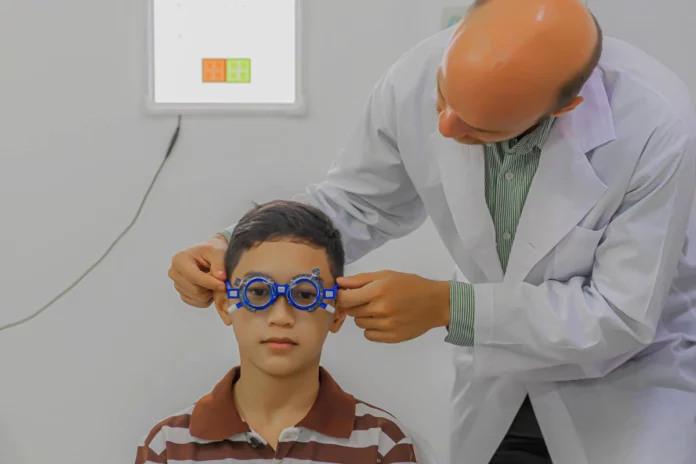Some people can see objects closer, but far away, objects are a distant blur. This condition is called short-sightedness or myopia. It is a problem that occurs mainly among young adults and children. Myopia occurs in people with incorrect eye shapes. The refracted light of the objects focuses before the retina instead of at the retina.
Table of Contents
See a Doctor
If you have myopia, you might be having difficulty performing tasks correctly, or your vision quality is detracting you from your daily activities. See an eye doctor immediately who can determine the level of your nearsightedness. Most probably, the doctor may prescribe eyeglasses and you can get new eyeglasses tomorrow as it’s so easy and fast when you order online.
Spend Time Outside
Increase the number of your outdoor activities as much as possible. Spending time outdoors during your early adult life and adolescence can decrease the risk of myopia. The ultraviolet ray of the sun changes the structure of the cornea and sclera to maintain a standard eye shape.
Protect Your Eyes
Wear sunglasses while out in the sun because they can shield your eyes from ultraviolet rays and halt the progression of myopia. Make sure you invest in high-quality as some cheap sunglasses can be detrimental to the eye muscles in the long run if worn for too long.
Eat healthy Food
Try to consume plenty of vegetables, fruits, and leafy greens. Your eyes can tremendously benefit if you include fish items, especially salmon, that are high in fatty acids and omega-3 fats. Including these in your daily diet can work wonders for the health of your vision.
Get proper Rest
Try to reduce your eye strain as much as possible. Taking breaks between your computer work by looking far away from screens for 20 seconds is a good strategy. This practice would give your eyes proper rest and can slow the development of short-sightedness.
Get surgery treatment
Sometimes doctors advise you to get laser or lens surgery to improve your eyes. The good thing about such surgeries is that they are permanent solutions that can see you through your lifetime. Laser surgery reshapes the eye, and lens surgery replaces the lenses with artificial lenses. Furthermore, short-sightedness can be a hindrance to professional and personal endeavors, but the Best Laser Eye Surgery in London offers a transformative experience, freeing individuals from the limitations of visual impairment.
Wearing special lens
Depending on your conditions, some opticians may advise orthokeratology, a lens worn overnight. This treatment can help improve your vision without contact lenses or glasses. If this is a suitable option, talk to your optician and see whether it would fit your situation.
Implantable Collamer lens
An implantable Collamer lens, popularly known as ICL, is a soft contact lens implanted in the eyes. It is made of polymeric materials. The lens is embedded in your eyes with a microscopic incision between your iris and your natural lens. It corrects the light refraction so that it falls right on the retina as opposed to before the retina.
The topical medication
Atropine drops are used as topical medication as a treatment for short-sightedness. It’s a prescribed eye drop, and the doses vary from person to person. When you drop them in your eyes, your pupil will dilate. This treatment can be a good treatment for some people.
Wear correct lenses
If worn correctly for the prescribed time frame, the right lenses can optimize and bring your vision to your natural sight. Regular exams are the best way to know whether you use the correct prescription lens. Wearing too weak a prescription can increase the progression of nearsightedness.
Maintain your health
If you have diabetic retinopathy, maintaining your weight and exercising can help not just your weight but also your vision. This condition can hurt the eye’s blood vessels due to the excess sugar circulating in the bloodstream. Check your sugar levels regularly and stay fit to lower the odds of developing short-sightedness.
Smoking is bad
Smoking raises the likelihood of developing short-sightedness. Avoid smoking for as long as you can, or smoke in moderation. The less you smoke, the more you will benefit by easing off the inflammation throughout your eyes, which can prevent age-related eye disorders.
Signs of short-sightedness
If you are experiencing the following, you may be having short-sightedness:
- You cannot see distant objects as clearly as you see nearby objects, which affects your normal daily functioning
- The vision beyond a certain peripheral point seems blurry but gets more apparent as you come close to those objects
- You often partially shut your eyes or squint to see things, especially if they are far away
- You get migraines and headaches often due to eyestrain caused by a hard day’s work
- It is difficult for you to see things clearly while driving or have trouble reading signs at night
An ophthalmologist or an optometrist can quickly diagnose any of the above symptoms. Your eye professional will also consider your other health aspects and advise you on the right way forward. You may have to get surgery, a pair of contact lenses or eyeglasses to correct your short-sightedness.



